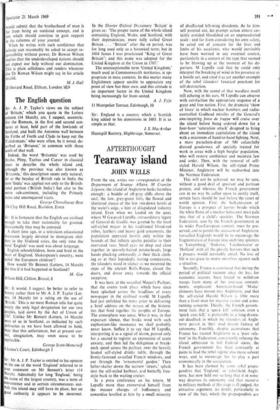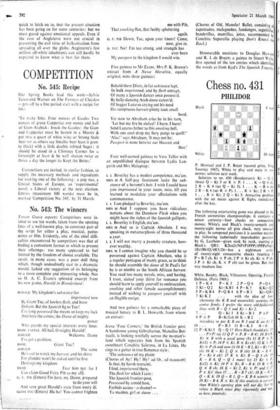Tearaway island
AFTERTHOUGHT JOHN WELLS
From the sea, writes our correspondent at the Department of Strange Affairs, M Crawlin Legume, the island of Angleterre looks harmless enough: a huddle of off-grey cliffs above the surf, the low, grey-green hills, the flawed and shuttered stucco of the few run-down hotels at the water's edge, a hint of dilapidated industry inland. Even when we landed on the quai, where M Gaspard Lepuffe, extraordinary legate of General de Gaulle, was greeted by the local self-styled mayor in his traditional blood-red robes, feathers and heavy gold ornaments, the population appeared hostile only within the bounds of that infinite apathy peculiar to their enervated race. Small eyes set deep and close together in sparsely-haired potato-heads, large hands plucking awkwardly at their thick cloth- ing or at their lopsidedly leering companions, the islanders stood in silence as we mounted the steps of the ancient Rolls-Royce, closed the doors, and drove away towards the official reception.
It was here, at the so-called Mayor's Parlour, that the events took place which have since been splashed across the headlines of every newspaper in the civilised world. M Lepuffe had just unfolded his notes prior to delivering a brief address on the nature of the historic ties that bind together the peoples of Europe. The atmosphere was tense. Who it was, in that expectant silence, that broke wind with such euphonium-like resonance we shall probably never know. Suffice it to say that M Lepuffe, interpreting it as a signal of alarm, paused only for a second to register an expression of acute anxiety, and then led the delegation at break- neck speed across the parlour, over the heavily loaded self-styled drinks table, through the firmly-fastened so-called French windows, and out through the 'ornamental garden.' Then helter-skelter down the narrow 'streets,' splash into the self-styled harbour, and butterfly free- style back to the waiting cruiser.
In a press conference on his return, M Lepuffe more than exonerated himself from the meaner charges of buffoonery and cowardice levelled at him by a small minority
of disaffected left-wing dissidents. As he him- self pointed out, his prompt action almost cer-
tainly avoided bloodshed on an unprecedented scale: and far from considering his own safety, he acted out of concern for the lives and limbs of his assailants, who would inevitably have been worsted in any eventual contest, particularly in a contest of the type that seemed to be blowing up at the moment of his de- parture. M Lepuffe said that he could only interpret the breaking of wind in his presence as a hostile act, and cited it as yet another example of the rebel islanders' fanatical penchant for self-destruction.
Now, with the sound of that wordless insult still echoing in his ears, M Lepuffe can observe with satisfaction the appropriate response of a great and free nation. First, the dramatic 'shim of force' in which nuclear bombers and radio- controlled Godhead missiles of the General's awe-inspiring force de frappe will cruise over the island before being ordered down for a four-hour 'saturation attack' designed to bring about an immediate capitulation of the island with a minimum of hand-to-hand fighting. Next, a mass parachute-drop of 500 colourfully dressed gendarmes, all specially trained for work in areas with a high burglar population, who will restore confidence and maintain law and order. Then, with the removal of self- styled Harold Wilson, the self-styled Prime Minister, Angleterre will be reabsorbed into the Norman Federation.
This will not be achieved, we may be sure, without a good deal of ignorant and partisan protest, and whereas the French government can in no way be called upon to justify itself, certain facts should be laid before the court of world opinion. First, the balkanisation of Europe is a prospect of horror beside which the white flame of a nuclear holocaust must pale into that of a child's sparkler. The Norman Federation, seen by the French government in its wider Pan-European context, must be pre- served, and to permit the secession of Angleterre (so-called England) would be to encourage the fragmentation of Europe into such tiny splinters as `Luxemburg,' Andorra,' 'Liechtenstein' or `Holland' with all the ghastly horrors that such a process would inevitably entail. No loss of life is too great to insure ourselves against such a situation.
Secondly, France is convinced that during the period of political vacuum since she has, for economic reasons, been forced to withdraw troops from many of her overseas commit- ments, unpleasant American-based 'Mafia' elements have moved into Angleterre, and that the self-styled Harold Wilson is little more than a front man for massive casino and arms- running concerns. Thirdly, the French govern- ment feels that a 'quick kill' solution, even a 'quick over-kill,' is preferable to a long-drawn- out deadlock in which the islanders of Angle- terre persist in their mad dream fantasy of autonomy. Fourthly. despite accusations that France has treated Angleterre as a 'poor rela- tion' in the Federation, consistently refusing the island admission to full Federal status, the French government has been constantly at pains to lead the rebel regime into more solvent ways, and to encourage her to play a part economically in the association.
It has been claimed by some rebel propa- gandists that 'England,' or rebel-held Angle- terre, has now held out so long that it in some way deserves its autonomy and that recourse to military methods at this stage is ill-judged. An attractive argument, no doubt, particularly in view of the fact, which the propagandists are quick to latch on to, that the present situation has been going on for some centuries : but we must guard against emotional appeals. Even if the case of Angleterre were not crucial in preventing the evil virus of balkanisation from spreading all over the globe, Angleterre's few million off-white inhabitants can still hardly be expected to know what is best for them.











































 Previous page
Previous page